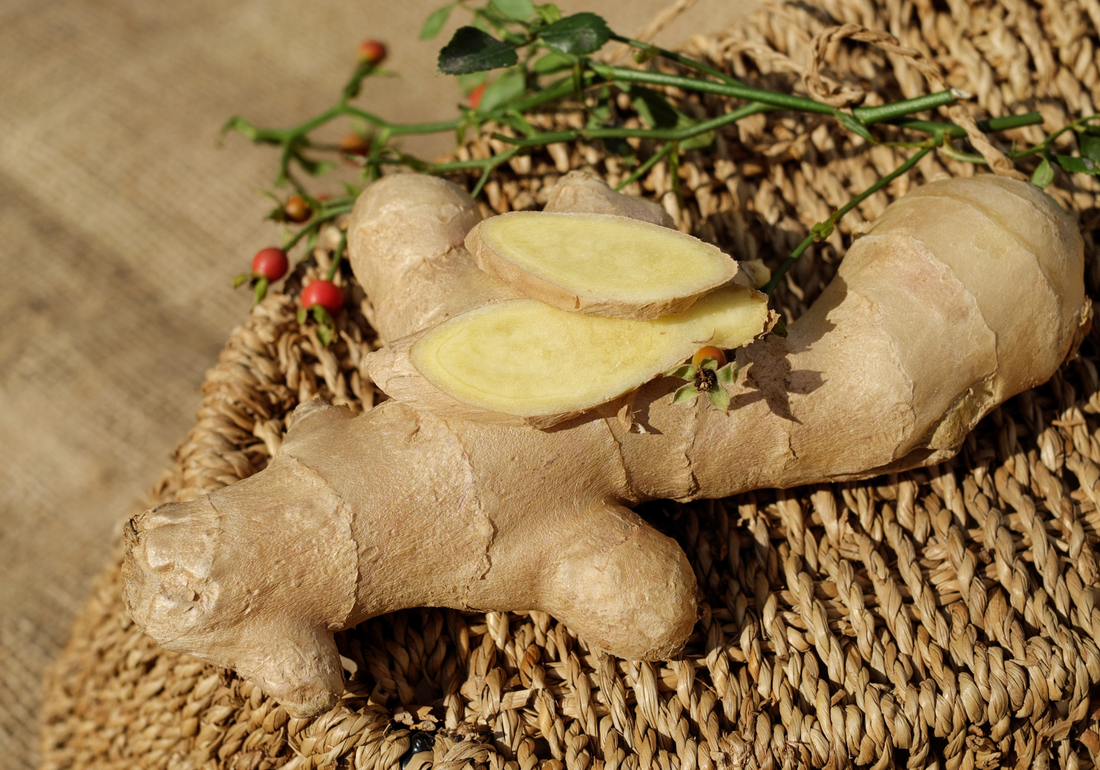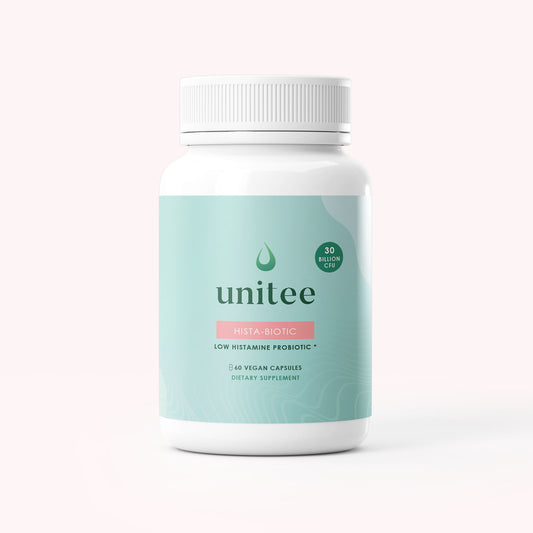How would you describe ginger?
If you were to ask me, I'd use just four words: Spicy. Zingy. Warm. Fragrant.
It’s an exotic addition to stir fries, curries, smoothies, and even cookies. Ginger can truly bring a boring dish to life. Yum!
Also, ginger is well known for its health benefits. It contains compounds with antioxidant and anti-inflammatory properties, it can stop nausea in its tracks, and it may even be useful for weight loss.
Considering all these benefits, are you worried you will have to cut it out of your histamine intolerance diet?
Let’s find out.
In this article, I explore the relationship between ginger and histamine intolerance, shedding light on whether this aromatic root is a friend or foe.
First, here’s a quick recap of what histamine intolerance is (1).
Understanding Histamine Intolerance
At the heart of the condition is the biogenic amine histamine, a chemical compound released by specific cells in your body. It is an integral part of your immune system, triggering the alarm when a potentially harmful organism or food particle is encountered by your immune cells.
It sets off a series of reactions that neutralize the threat. Once the risk to your well-being has been taken care of, histamine is usually broken down by two enzymes, namely diamine oxidase (DAO) and HNMT. These enzymes keep histamine levels in your body under control so there is never too much or too little going around.
However, when you have histamine intolerance, histamine levels rise to levels that are intolerant to the body to cope with. This rise in histamine is typically the result of insufficient breakdown of histamine by the DAO enzyme, and it leads to a wide range of symptoms that can affect many parts of your body such as the:
- Digestive system: Irritable bowel syndrome (IBS), bloating, diarrhea, nausea, and acid reflux.
- Skin: Acne, hives, itching, and rashes.
- Respiratory system: Runny nose, sneezing, asthma, and difficulty breathing.
- Cardiovascular system: Low blood pressure, high blood pressure, heart palpitations, and dizziness.
- Brain and mental health: Anxiety, irritability, poor concentration, headaches, headaches, and fatigue.
You may experience only one or two symptoms, or you could be dealing with a whole range of them. The first step to overcoming histamine intolerance is identifying your triggers, which might include certain foods, medications, and environmental factors leading to higher than normal histamine build up.
So, the question remains: is ginger part of these triggers?
Is Ginger High in Histamine?
The short answer is no, ginger is not high in histamine. How’s that for a piece of good news for anyone with histamine intolerance who enjoys the zing ginger adds to your food?
The next question then, is ginger low-histamine? Here’s some more good news! Ginger is indeed considered a low-histamine option for adding flavor to your meals.
When compared to notorious high-histamine foods like aged cheeses, fermented foods, and seafood, ginger’s histamine content is negligible.
It gets even better...
Ginger and Histamine Intolerance
Not only is ginger low in histamine, it contains a complex array of bioactive compounds, including gingerols and shogaols. These chemicals are responsible for the numerous health benefits of ginger which include (2):
- Anti-inflammatory properties: Help reduce oxidative cell damage, thus improving pain and swelling in conditions such as arthritis.
- Digestive aid: Ginger has been used for centuries to treat various digestive issues. It can help relieve nausea, reduce bloating, and improve overall gut health. It's particularly effective in treating morning sickness in pregnant women and nausea caused by chemotherapy.
- Immune system boost: The antioxidants in ginger can help strengthen your immune system, potentially reducing the risk of infections.
- Blood sugar regulation: Some studies suggest that ginger may help lower blood sugar levels and improve insulin sensitivity, which could be beneficial for people with diabetes.
- Heart health: Ginger may help lower cholesterol levels and blood pressure, both of which are risk factors for heart disease.
- Anti-cancer properties: While more research is needed, some studies indicate that certain compounds in ginger may have anti-cancer effects, particularly against gastrointestinal cancers.
- Brain function: The antioxidants in ginger may help protect against age-related decline in brain function and could potentially reduce the risk of Alzheimer's disease.
- Respiratory health: Ginger's anti-inflammatory properties may help relieve asthma symptoms by relaxing the smooth muscle in the airways.
Even more interesting is the ginger-histamine relationship. A 2020 study found that ginger extract has a powerful antihistamine effect (3). In fact, it was found to be as good as a popular antihistamine medication for managing allergic rhinitis.
The antihistamine effects are largely due to the anti-allergy compounds gingerol and shogaol. They can stop an allergic reaction in its tracks by preventing the release of chemicals such as histamine from the mast cells.
Ginger for Histamine Intolerance: Friend or Foe?
So, am I saying ginger is good for histamine intolerance? For many people living with the symptoms caused by high levels of histamine, ginger can certainly be a beneficial addition to your diet.
Not only does it help reduce histamine release, but its anti-inflammatory properties also alleviate some histamine-related symptoms. In addition, ginger supports digestive health, which is often compromised in people with histamine intolerance (4).
It’s important to note that individual responses may vary. Ginger may worsen symptoms in some people, especially if you have gastritis or severe symptoms of heartburn. If you're unsure about adding ginger to your low-histamine diet, it's best to chat to your histamine intolerance healthcare provider about how to include it in your meals.
Ginger also doesn't always need to be eaten. There's another great way to add ginger to your low histamine routine.
Benefits of Ginger Tea for Histamine Intolerance
Soaking sliced pieces of ginger root in hot water makes a warming and fragrant ginger tea. Histamine intolerance sufferers often find this brew soothing, especially when consumed at night because of it's natural antihistamine effects.
Whenever possible, use fresh ginger root instead of commercial ginger tea bags, which might contain additional ingredients that may be higher in histamine.
To make fresh ginger tea:
- Trim off the knots and dried ends of a ½ -inch piece of ginger root, and peel it.
- Using a sharp knife, cut it into thin slices.
- Place the sliced ginger in a mug and pour boiling water over it.
- Let the ginger steep for at least 10 minutes, covering the mug to keep those essential oils inside.
- Once brewed, add a little raw honey if you prefer a sweeter tea.
Incorporating Ginger Into a Low-Histamine Diet
For some delicious low histamine recipes that include ginger as an ingredient, be sure to explore our library. We have Antihistamine Maple Ginger Chicken, Low Histamine Pumpkin Mousse Dessert, and a refreshing Superfood Low Histamine Smoothie that are sure to make your tastebuds tingle.
Of course, there is no single food or ingredient that will help you overcome histamine intolerance. So, although ginger offers significant benefits, it is only one part of a low-histamine diet.
There are more great natural antihistamine foods you can include in your low histamine diet alongside ginger. These include:
- Onion
- Garlic
- Fresh ginger
- Fresh turmeric
- Fresh peppermint
- Pomegranate
- Apple
To make it as simple as possible for you to follow a low-histamine diet and take control of your histamine intolerance, we have compiled a comprehensive diet guide.
Precautions and Considerations When Including Ginger In Your Low Histamine Diet
Start slowly when adding ginger to your diet. While generally safe, it can cause side effects in some people. Consuming large amounts may lead to heartburn, gas, or bloating.
Ginger can also interact with certain medications like blood thinners, diabetes drugs, and those used to control hypertension (5).
If you have histamine intolerance, or suspect you might, consult with a healthcare professional knowledgeable in the condition before making changes to your diet and supplement regimen, and never stop any medications on your own. It's important to address any drug changes with your doctor, to ensure you're doing so safely.
Ginger: Histamine Intolerance Support
Ginger, with its low histamine content and potential anti-allergy benefits, can be a valuable addition to a histamine intolerance diet.
Despite its health-promoting compounds, as with any dietary change, approach ginger consumption mindfully. Start with small amounts and monitor your body’s response.
Ginger is a promising herb for people with histamine intolerance, but it is not a one-size-fits-all solution. A personalized approach is the best strategy to managing histamine conditions to ensure you're getting the most benefit from the recommendations.
References:
- Comas-Basté O, Sánchez-Pérez S, Veciana-Nogués MT, Latorre-Moratalla M, Vidal-Carou M del C. Histamine Intolerance: The Current State of the Art. Biomolecules. 2020 Aug 14;(8):1181.
- Bode AM. The Amazing and Mighty Ginger - Herbal Medicine - NCBI Bookshelf [Internet]. National Center for Biotechnology Information.
- Yamprasert R, Chanvimalueng W, Mukkasombut N, Itharat A. Ginger extract versus Loratadine in the treatment of allergic rhinitis: a randomized controlled trial. BMC Complementary Medicine and Therapies. 2020 Apr 20;(1).
- Nikkhah Bodagh M, Maleki I, Hekmatdoost A. Ginger in gastrointestinal disorders: A systematic review of clinical trials. Food Science; Nutrition. 2018 Nov 5;(1):96–108.
- Ginger Information | Mount Sinai - New York. Mount Sinai Health System.

Anita Tee
My name is Anita Tee. I'm a nutritional scientist specializing in histamine intolerance. I hold a Master of Science in Personalized Nutrition and a Bachelor of Science in Human Biology and Psychology.
For the past ten years, I have used my experience in nutritional and medical health sciences to create a scientifically backed, natural approach to healthcare that relies 100% on evidence-based research.
As I previously suffered from - and overcame - histamine intolerance, my focus is to increase recognition and expand the available resources and protocols for resolving the disorder. To date, I have helped over 4,000 individuals fully resolve or better manage their histamine intolerance symptoms.







